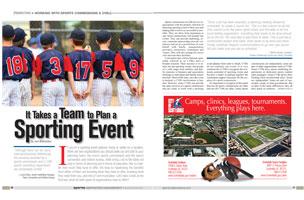
If you're a sporting event planner trying to settle on a location, there are two organizations that you should seek out and add to your planning team: the area's sports commission and the area's convention and visitors bureau. Both bring a lot to the table not only in terms of planning but in terms of execution. But no matter how much they have to offer, the keys to maximizing the benefits from either of them are knowing what they have to offer, knowing what they need from you, and lots of communication. Let's take a look at the first key: what do both types of organizations have to offer?
Sports Commissions are full-service organizations with the primary function of attracting sporting events to their area and helping that event be as successful as possible. They are there from beginning to end. Some commissions will actually run events. They can provide marketing, secure corporate sponsorship, provide volunteers, and act as a go-between on your behalf with hotels, transportation providers, attractions, restaurants, and venues. They will also arrange for you to visit and tour their facilities.
Convention and visitors bureaus (generally referred to as CVBs) have a broader mission. Their mission is to attract not just sporting events but groups of a wide range from military and family reunions to business and association meetings to individual and family leisure travelers. Most of the time, once the event is booked, a CVBs involvement is limited. However, many CVBs can provide the same services as a sports commission and are ready to work with a sporting event planner from start to finish. CVBs do not routinely run events. It is very common for a CVB to recognize the economic potential of sporting events and become a leader in pulling together the community support necessary for the creation of a sports commission.
 It's important to recognize at this point that not all sports commissions are alike and not all CVBs are alike. Some sports commissions are independent; some are part of other organizations such as CVBs. Some CVBs have sports marketing departments or dedicated sports market sales managers. Some CVBs derive their funding from membership dues. Some are independent. Some are part of municipal, county or state governments. But in spite of the many differences, they all have much in common. They have been charged by their appointing authorities to attract sports events to their area.
It's important to recognize at this point that not all sports commissions are alike and not all CVBs are alike. Some sports commissions are independent; some are part of other organizations such as CVBs. Some CVBs have sports marketing departments or dedicated sports market sales managers. Some CVBs derive their funding from membership dues. Some are independent. Some are part of municipal, county or state governments. But in spite of the many differences, they all have much in common. They have been charged by their appointing authorities to attract sports events to their area.
Whether it's a sports commission or a CVB, they will have a Web site. Short of actually making a visit, this is the best and easiest way to explore a location. Look for information on lodging, venues, restaurants, and attractions as well as the services the commission or CVB provides. Their site should make it easy to decide whether the location should be on your short list of possibilities.
The second key to maximizing the resources of these organizations is knowing what they need from you. At no time is this need for communication more important than at the beginning. Both sports commissions and CVBs utilize Request for Proposals (RFPs). This form is almost universally available on line at the organizations Web site. An RFP will guide you through all of the information the commission or CVB needs in order to allow them to present a comprehensive and meaningful bid. Completing an RFP does not mean that the information you will give is set in stone. Answer the questions as well as you can. If you are not sure what the RFP is asking for, someone at the commission or CVB will be happy to go over it with you. If you're submitting multiple RFPs, it is important that the information is consistent so that accurate comparisons can be made.
A typical RFP will ask for your contact information (including an e-mail address and the Web site of your organization), the proposed dates of the event (including alternative dates), the number of hotel rooms you expect that you will need each night of the event, how many meals you may need to provide (including the number of diners and whether the meal is breakfast, lunch or dinner), how many meeting rooms you will need (specify the layouts desired), a description of the event (including the sports involved, the number of venues required, and the expected number of participants), and a history of past events (including dates, locations, and hotel rooms used). If there is information that is critical, but is not addressed by the RFP, there is usually a field on the RFP where that can be included. Specify the required format and, even more importantly, the deadline for submission. Once the commission or CVB has your RFP they can then review the information and see if will be a good match for their community. They can then begin to put a bid together.
After you have all of the bids in hand, you'll want to visit the locations that seem promising. Most of the commissions and CVBs will be eager and willing to show you their communities and facilities. Before making a site visit, clarify what expenses of the trip can and will be covered. Policies vary from organization to organization so don't make any assumptions. Request a visit as far in advance as possible so your hosts will have enough time to make all the necessary arrangements. Let them know when you can come, how long you can stay, how many people you will be bringing, and what you need to see when you arrive. During this visit, the third key, communication, comes to center court to join the second key. It's time to talk about the details. An honest discussion about what you want and what they can provide is essential. The specific requirements are, of course, unique to each sporting event but, whatever they are, they must be clearly communicated.
When you've evaluated all the contenders and awarded the bid, communication becomes crucial. For your sporting event to succeed, you and the chosen organization must perform as a team. To get the most of your new team mates, schedule a meeting (in person, via conference call or even a video linkup) and start planning. At the first meeting, create a schedule of what has to happen, when it has to happen, and who is responsible to make it happen. No detail is too small and nothing should be taken for granted. One advantage of dealing with a commission or CVB is that you may be working with a staff with whom you are familiar and will know what to expect. Although sports commissions are usually staffed by sporting event professionals, you may find that some CVBs have less experience and may not be familiar with the needs of a sports event: officials, athletic trainers, etc. Share your expertise with them and help them understand those needs. Regular and frequent review meetings should be built into the schedule. Once the commission or CVB knows exactly what their assignments are they can begin pulling together the infrastructure for your event. Their familiarity with local resources will streamline the work of staging the event. They are in a good position to negotiate comp rooms, attractive rates and rebates from hotels and solicit financial support from local businesses. You know what you want. They know who can provide it.
It's a cliché to say that any activity requires teamwork, but it's true nonetheless. And a sports commission or a convention and visitors bureau can be a truly valuable member of your team. Knowing what they can do, knowing what they need from you to do it, and maintaining open and honest communication from start to finish can help make your sports event such a success that participants will go home looking forward to next year.

